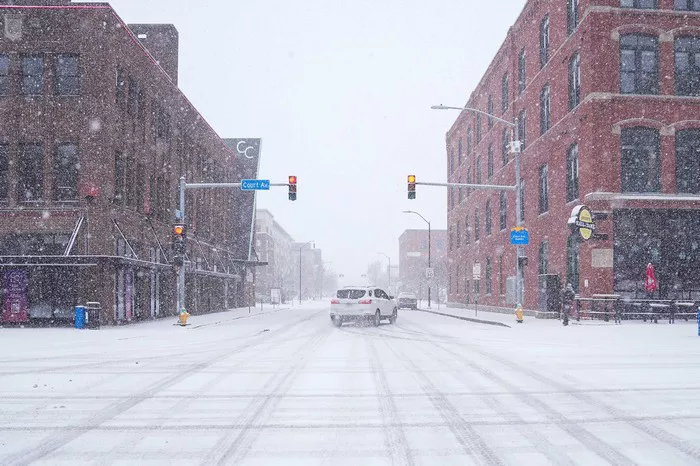As winter storms sweep across the United States, millions of residents are facing the combined threat of severe weather conditions and the risks that come with power outages. As temperatures drop and snow accumulates, many families turn to alternative heating sources, such as portable generators and space heaters, to stay warm. However, these devices, while helpful, also pose significant safety hazards if not used correctly. The U.S. Consumer Product Safety Commission (CPSC) is emphasizing the importance of taking proactive steps to avoid dangerous situations, including carbon monoxide poisoning, fire hazards, and electrical accidents. In this article, we provide crucial safety tips to help families navigate these stormy conditions and protect themselves from the hidden dangers of carbon monoxide and fires.
Carbon Monoxide Poisoning and Fires
As severe winter storms threaten millions across the central Plains, Midwest, Ohio Valley, and mid-Atlantic regions this week, authorities are warning of increased risks related to power outages, carbon monoxide poisoning, and fires. The U.S. Consumer Product Safety Commission (CPSC) is urging households to take preventive measures to stay safe during these dangerous weather conditions. In light of the potential for power disruptions and increased use of home heating devices and generators, the CPSC is offering essential tips to help families avoid carbon monoxide poisoning, fire hazards, and other related dangers.
Power Outages and Safe Generator Use
The CPSC urges consumers to be particularly cautious when winter storms cause power outages. Portable gasoline-powered generators can pose deadly carbon monoxide (CO) poisoning risks. Often referred to as the “invisible killer,” CO is colorless, odorless, and can be fatal in minutes. Those exposed to CO may lose consciousness before even noticing the initial symptoms like nausea, dizziness, or weakness.
The CPSC reports that, on average, 100 U.S. consumers die each year due to CO poisoning from portable generators.
To help protect yourself and your family during a power outage, follow these critical guidelines:
Never use a generator inside any enclosed space, including homes, garages, basements, crawlspaces, or sheds. Simply opening windows or doors will not provide enough ventilation to prevent dangerous CO buildup.
Place generators outdoors, at least 20 feet away from the house, and never on porches or in carports where the generator could emit exhaust into the home.
Direct the exhaust away from any building where people might enter, and seal off windows and vent openings in the area of the generator’s exhaust.
Adhere to the generator’s instructions about electrical shock risks during inclement weather, including potential use of non-combustible generator tents or waiting until rain passes.
Regularly check and maintain your generator to ensure it is ready for use when needed. Always follow the manufacturer’s instructions and warnings.
Opt for generators with CO shut-off safety features. These models automatically shut off when dangerous CO levels are detected. Choosing generators certified to the latest PGMA G300-2018 and UL 2201 standards can significantly reduce the risk of CO poisoning by 86% and up to 100%, respectively. UL 2201 certified models also reduce CO emissions.
Carbon Monoxide and Smoke Alarm Maintenance
Ensuring working CO and smoke alarms are crucial for safety. Install CO alarms with battery backup on every level of your home, and near separate sleeping areas. Interconnected alarms are recommended as they ensure the sound of one alarm triggers all others.
Test alarms monthly to confirm they are working, and change the batteries if necessary.
Never ignore an alarm. If it goes off, leave the house immediately and call 911.
Keep fuel-burning appliance vents clear of snow to prevent dangerous CO buildup.
Portable Heater Safety
When using portable heaters, take extra care to avoid fire hazards:
Maintain at least 3 feet of clearance around the heater from bedding, curtains, clothing, and other flammable materials.
Ensure the heater is placed on a stable, level surface where it won’t tip over.
Never leave a portable heater unattended in a confined space to prevent the risk of hyperthermia.
Always plug electric heaters directly into a wall outlet—never use a power strip or run the cord under rugs or carpeting.
Keep children and pets at a safe distance from the heater.
Dangers of Charcoal and Candles
Avoid using charcoal indoors—burning it in an enclosed area can create lethal levels of CO. Never use a charcoal grill in a garage, even if the door is open.
When using candles, be cautious:
Opt for flashlights or battery-operated candles instead.
If using real candles, place them away from flammable objects, and never leave them unattended. Extinguish them before leaving the room or going to sleep.
Gas Leak Precautions
If you detect the smell or sound of gas leaking, evacuate your home immediately. Do not use any electronics, including lights or phones, before leaving. Contact local gas authorities from a safe location outside the house.
Flooded Homes and Wet Appliances
If your home has been affected by flooding, take extreme care with your electrical appliances:
Do not touch wet appliances that are still plugged in.
Have a professional assess your home and replace any appliances, gas control valves, electrical wiring, or circuit breakers that have been submerged in water before attempting to use them again.
Conclusion
As winter storms continue to affect millions across the U.S., it is essential that households remain vigilant and follow safety protocols to avoid carbon monoxide poisoning, fires, and other hazardous situations. By taking simple but vital precautions, families can reduce their risks and ensure their safety during these extreme weather events. The CPSC’s safety tips serve as a crucial guide to preventing tragedies and protecting loved ones in the midst of winter storms. Stay prepared, stay safe, and always prioritize your family’s well-being.
Related topics:

